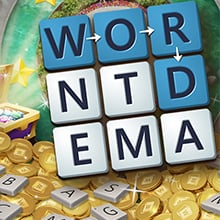
Search a Word Games
Discover 34 amazing search a word games. Play for free and have fun!
About Search a Word Games
What Are Search A Word Games?
Search A Word games, often known as word search puzzles, are a form of puzzle game in which the goal is to locate and mark all of the words hidden within a grid of letters. The words are often listed alongside the grid and can be organized in a variety of ways, including:
-
Horizontally (left to right or right to left)
-
Vertically (top to bottom or bottom to top)
-
Diagonally (in any direction)
The challenge is to locate all the hidden words, which may overlap and intersect within the grid. These games are popular for their simplicity and are often used for educational purposes to help improve vocabulary and pattern recognition skills.
The Rule Of Search A Word Games
These games have a grid filled with letters where words are hidden in various directions. This means that players must carefully scan the grid in all possible directions to locate the hidden words. To play the game, start by reviewing the provided list of words that need to be found.
As you locate each word in the grid, you can mark it by circling, highlighting, or drawing a line through it. In digital versions of the game, marking words might involve clicking and dragging to select the word. It's important to note that words may overlap and share letters with other words, adding an extra layer of challenge to the puzzle.
The game is finished when all of the words on the list have been found and marked on the grid. A strategic approach can be beneficial, such as examining the grid row by row or column by column, and can help you avoid missing any words. Players should also search for uncommon letter combinations or letters that stick out, making it easier to identify the words.
Remembering that words can be ordered in any orientation allows players to conduct a thorough search of the grid. Search A Word games are both fascinating and educational due to their attention to detail and strategic searching, which aids in the improvement of vocabulary and pattern recognition skills.
How Search A Word Games Attract Too Many Players?
Because of their simplicity and accessibility, search and word games appeal to a vast and diverse audience. The rules are simple, making them easy to grasp and play for people of all ages and ability levels. Unlike many other games, Search a Word puzzles do not require any extra equipment—only a grid of letters and a list of words.
Another factor contributing to the popularity of Search a Word games is their educational value. These puzzles help players expand their vocabulary by introducing new words and reinforcing the spelling of old ones. Furthermore, the cognitive benefits are enormous; while working on the puzzles, players enhance their pattern recognition, focus, and problem-solving abilities. These educational benefits make word search games especially appealing to parents and educators looking for enjoyable and effective learning aids.
Flexibility and diversity are other important considerations for enticing players. Word searches can be adjusted to specific themes, such as festivals, seasons, or educational topics, to keep the information new and interesting. The puzzles can range in difficulty, from basic grids for beginners to intricate ones for advanced players. This variety helps to sustain interest over time and encourages repeat play.
Many players find the puzzles to be a soothing activity, providing a break from more stressful or demanding tasks. Completing a word search puzzle offers a sense of accomplishment and satisfaction, which can be particularly rewarding. This combination of relaxation and achievement makes the games a popular choice for leisure time.
The introduction of digital adaptations has substantially expanded the scope of word search games. These puzzles are conveniently available at any time and from anywhere thanks to online platforms and mobile apps. Digital versions frequently add interactive features such as hints, timing, and score monitoring, which improve the whole gaming experience. These features appeal to technologically adept players as well as those seeking a more dynamic and interesting gaming experience.
Customization options further increase the appeal of Search a Word games. Some platforms allow users to create their own word searches, incorporating specific words and themes that are meaningful to them. This personalization adds a unique and enjoyable dimension to the game, making it more relevant and enjoyable for the player.


































